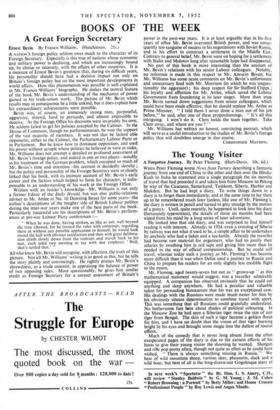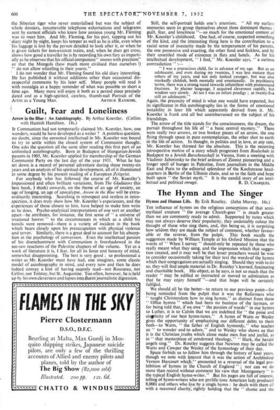The Young Visiter
A Forgotten Journey. By Peter Fleming. (Hart-Davis. 10s. 6d.) WHEN Peter Fleming wrote News from Tartary describing a fantastic journey from one end of China to the other and then over the Hindu- Kush to India he crammed into a single paragraph the six months of travel that had preceded it and taken him from Moscow to Peking by way of the Caucasus, Samarkand, Tashkent, Siberia, Harbin and Mukden. But he had kept a diary. To write things down in a diary is to forget them immediately, and at the same time to lay them up to be remembered much later (unless, like one of Mr. Fleming's, the diary is written in pencil and turned to grey smudge by the motion of a pony). Until, quite recently, he happened to look into his diary (fortunately typewritten), the details of those six months had been wiped from his mind by a long series of later adventures.
He looked into that old diary, and was surprised to find himself reading it with interest. Already, in 1934, even a crossing of Siberia by railway was not what it used to be, a simple affair to be undertaken by anybody who had a ticket and a tea-kettle. Already the traveller had become raw material for organisers, who had to justify their salaries by swathing him in red tape and giving him more than he needed in the way of official companionship. But he could still travel, whereas today such a journey as Mr. Fleming's has become more difficult than it was when Defoe used a journey to Russia and China to prepare his readers for an only slightly less credible flight to the moon.
Mr. Fleming, aged twenty-seven but not as " grown-up " as this mathematical statement would suggest, was a traveller admirably equipped. A companion has observed enviously that he could eat anything and sleep anywhere. He had a peculiar and valuable talent for persuading bureaucrats that his was an exceptional case. His dealings with the Russians were made much easier for him by his obviously sincere determination to combine travel with sport. This was something that all Russians could gratefully understand. No bothersome fuss here about shades of political colouring. In the Moscow Zoo he had seen a Siberian tiger twice the size of any tiger from Bengal. The skin of such a tiger became a golden fleece for him, and I have no doubt that the vision of that tiger burning bright lit his eyes and brought some magic into the dullest of tourist offices.
Much of the comedy that is never long absent from the often exasperated pages of the diary is due to the earnest efforts of his hosts to give their young visitor the shooting he wanted. Shotgun and rifle pop pretty often, though not quite as often as he could have wished. " There is always something missing in Russia." We hear of wild mountain sheep, various deer, pheasants, duck and a wild boar, but best of all is the long-drawn-out Gogolesque story of the Siberian tiger who never materialised but was the subject of whole dossiers, innumerable telephone exhortations and telegrams sent by earnest officials who knew how anxious young Mr. Fleming was to meet him. And Mr. Fleming, for his part, tapping out his ' diary night by night, keeps his temper as well as he is able, even when ' his luggage is lost by the person detailed to look after it, or when he is given tickets for non-existent trains, and; when he does get cross, shows how good a traveller he is by recording his own fury as imparti- ally as he observes that his official companion" snores with precision" or that the Mongols (how much more civilised than ourselves !) " do not allow whistling in their yourts." ' 1 do not wonder that Mr. Fleming found his old diary interesting. He has published it without additions other than occasional dis- respectful comments by his later self. Many people will read it with nostalgia as a happy reminder of what was possible so short a time ago. Many more will enjoy it both as a period piece precisely dated and as a high-spirited, careless, thumb-nail Portrait of the



































 Previous page
Previous page